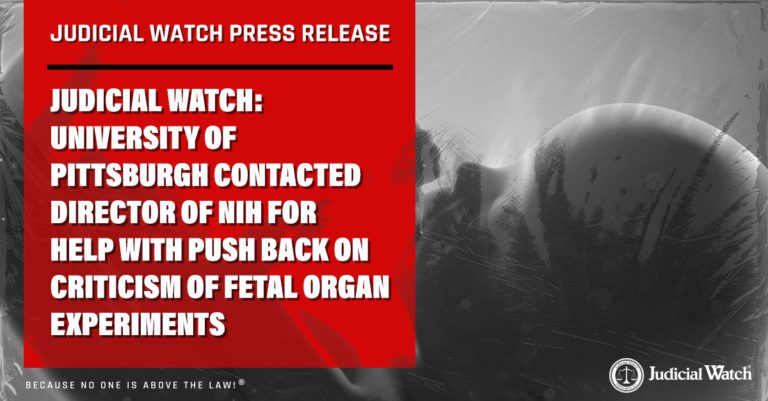
Judicial Watch: University of Pittsburgh Contacted Director of NIH for Help with Push Back on Criticism of Fetal Organ Experiments

Plea to NIH Includes Research Information about Grafting Fetal Scalp Tissue onto Mice
(Washington, DC) – Judicial Watch announced today it obtained 34 pages of new records revealing that the Associate Senior Vice Chancellor for Science Strategy and Planning in the Health Sciences at the University of Pittsburgh, Dr. Jeremy Berg, contacted then-Director of the National Institutes of Health (NIH), Francis Collins requesting help to combat, “efforts to undermine important science using fetal tissue.” Additionally, the records include a scientific report containing information about grafting human scalp and other tissues onto mice.
Judicial Watch obtained the records in response to a Freedom of Information Act (FOIA) lawsuit against the U.S. Department of Health and Human Services (HHS) for records of communication related to a September 21, 2021, letter sent by Sen. James Lankford and nearly 100 members of Congress demanding an investigation into the University of Pittsburgh’s potentially illegal fetal tissue research (Judicial Watch v. U.S. Department of Health and Human Services (No. 1:22-cv-00296)).
This lawsuit was filed in the United States District Court for the District of Columbia after HHS and its component, the National Institutes of Health (NIH), failed to respond to November 16, 2021, FOIA request for:
All records of communication, including emails and text messages, regarding the September 21, 2021 letter co-authored by Sen. James Lankford and other congressmen to Director Francis Collins, demanding an investigation into the University of Pittsburgh’s program of fetal body parts procurement and experimentation (copy attached), sent to and from the following NIH officials: Director Collins, Principal Deputy Director Lawrence A. Tabak, Acting Chief of Staff John T. Burklow, and Acting Associate Director Renate H. Myles
In August 2021, Judicial Watch and the Center for Medical Progress through a separate FOIA lawsuit uncovered HHS documents that revealed nearly $3 million in federal funds were spent on the University of Pittsburgh’s quest to become a “Tissue Hub” for human fetal tissue ranging from 6 to 42 weeks gestation. Among other findings, the records revealed:
- The aims of the project listed in the original 2015 proposal were to “develop a pipeline to the acquisition, quality control and distribution of human genitourinary [urinary and genital organs and functions] samples obtained throughout development (6-42 weeks gestation). … [and] generate an ongoing resource to distribute fresh developmental human genitourinary samples from various stages (6-42 weeks) to the GUDMAP [GenitoUrinary Development Molecular Anatomy Project] Atlas projects.”
- In the proposal, Pitt notes that is has been “collecting fetal tissue for over 10 years … include[ing] liver, heart, gonads, legs, brain, genitourinary tissues including kidneys, ureters and bladders.”
- Pitt noted in 2015 “we have disbursed over 300 fresh samples collected from 77 cases. The collections can be significantly ramped up as material could have been accrued from as many as 725 cases last year.”
- The Health Sciences Tissue Bank at Pitt is “embedded within the Department of Pathology … thus providing rapid access to very high quality tissue and biological specimens.”
- Pitt boasts it has a number of internal connections as well as a “strong working relationship with UPMC [University of Pittsburgh Medical Center] and the Department of Pathology” as well as three “laboratories in the flagship UPMC hospitals.” This includes a lab boasting a “ButcherBoy band saw for sectioning bone,” and a “frozen section room has digital video feed to and from the operating rooms. This also allows for instantaneous discussions with the surgeons as well [as] immediate ‘show and tell’ for them.” The proposal ironically also boasts about the laboratories at the “Children’s Hospital of Pittsburgh.”
- Later in the proposal, Pitt states that it records the “warm ischemic time on our samples and take steps to keep it at a minimum to ensure the highest quality biological specimens.” [The “warm ischemic time” refers to the amount of time an organ remains at body temperature after blood supply has been cut off. Warm ischemic time differs from cold ischemic time which refers to amount of time the organ is chilled. Pitt’s statement suggests the time between the abortion and collection is minimal.]
The newly obtained records include an email dated October 16, 2021, from the University of Pittsburgh’s Dr. Jeremy Berg, associate senior vice chancellor for science strategy and planning, contacting then-Director of the National Institutes of Health (NIH), Francis Collins, requesting help with the negative press they were receiving about their work with aborted human tissue. Dr. Berg specifically highlights a Fox News report:
Hi Francis:
I write regarding ongoing efforts to undermine important science using fetal tissue. As you no doubt know, various public universities have been the subject of rotating attacks about research using fetal tissue, sometimes citing NIH support for the research. It is now the University of Pittsburgh turn in the spotlight. The event that triggered this is the publication of a paper (attached) on grafting fetal skin onto rodents supported by an R21 from NIAID (https://reporter.nih.gov/search/cbh4-6MG-UCNgeeBHC15ew/projectdetails/9599671). I provide this only for background as the details do not matter for the issue I am raising.
Pitt’s response to concerns raised by state legislators and various news outlets has been to commission an outside review of Pitt’s practices and compliance. The University believes that all appropriate practices and laws have been followed. However, this outside review has been met with additional complaints (see https://www.foxnews.com/us/pittsburgh-investigation-fetal-tissue-probe-conesilence).
We have been discussing these issues and it seems that this is an organized attempt to delegitimize science based on fetal tissue rather than to identify misbehavior (although, of course, any misbehavior does create opportunities for outrage). In light of this, we feel that the scientific community would benefit if more institutions could stand together to take some of the power out of the one at-a-time strategy that appears to be operating.
Our Chancellor Pat Gallagher, former Director of NIST and your Senate confirmation colleague would like the opportunity to discuss this with you or other appropriate individuals at NIH via whatever venue would be preferred (phone, Zoom, in Bethesda).
If this is possible, please let me know the best way to make the appropriate arrangements.
Also included is a report published in “Nature” that contains information about grafting human scalp and other tissues onto mice:
Human skin tissues were obtained from the scalp and dorsum of donors and were used in developing human skin engraftment with and without hair in the mouse model, respectively. Full-thickness human fetal skin was processed via removal of excess fat tissues attached to the subcutaneous layer of the skin, then engrafed over the rib cage, where the mouse skin was previously excised.
In an email exchange on October 17, 2021, Lawrence Tabak, the acting director of NIH, responds to Berg’s request for a meeting and work to schedule a time to meet: “Mike [likely Mike Lauer] indicated that it is arranged (dropping FC to bbc line).”
In February 2022, Chair of the House Pro-Life Caucus, Rep. Chris Smith (R-NJ) called the investigation a “whitewash” and added:
A truly transparent and comprehensive assessment would not have evaded the questions raised by public records, especially and including whether the University of Pittsburgh used the body parts of babies who were born alive and died from having their organs harvested, as well as if individuals procuring the baby body parts for the university altered abortion procedures to suit their gruesome research.
“These documents expose the collusion between the University of Pittsburgh and the NIH over the fetal organ ‘chop shop’ in the University of Pittsburgh paid for with federal tax dollars,” said Judicial Watch President Tom Fitton. “Here we have the federal government and a major university seemingly desperate to continue the barbaric trafficking the organs of human beings killed by abortion.”
In September 2021, Judicial Watch uncovered through a related FOIA lawsuit records and communications from the U.S. Food and Drug Administration (FDA) involving “humanized mice” research with human fetal heads, organs and tissue, including communications and contracts with human fetal tissue provider Advanced Bioscience Resources (ABR). Most of the records are communications and related attachments between Perrin Larton, a procurement manager for ABR, and research veterinary medical officer Dr. Kristina Howard of the FDA.
###
















